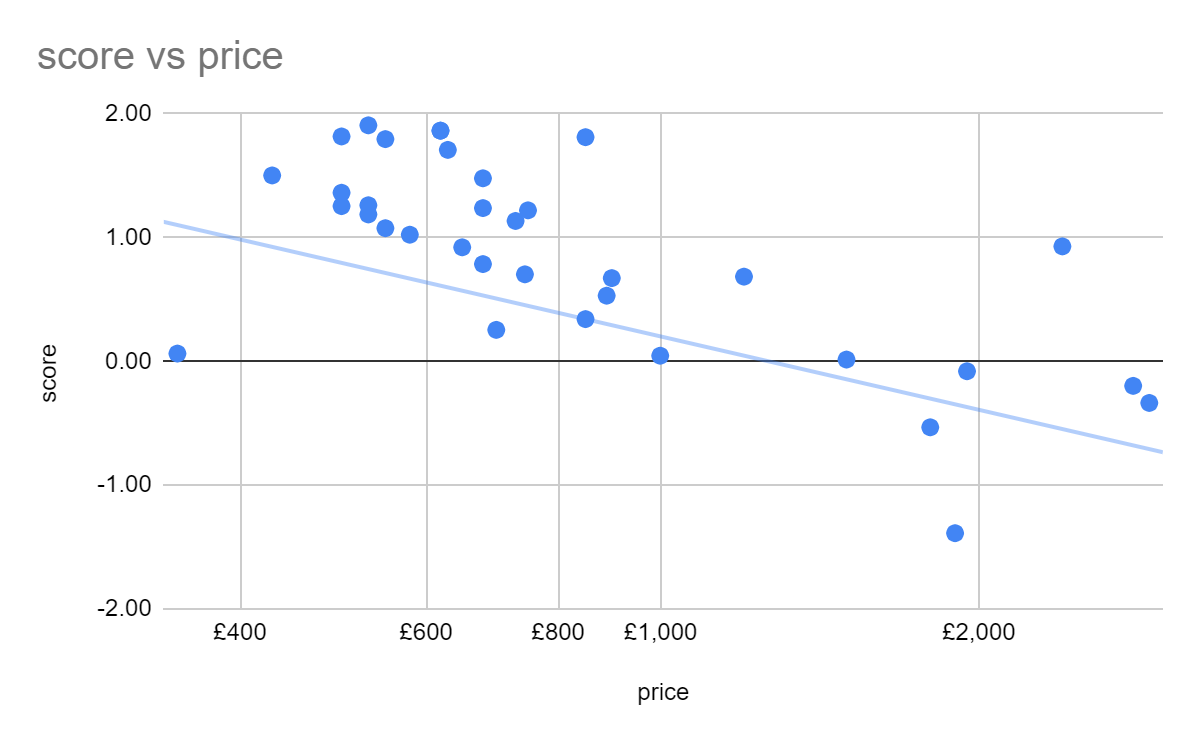Recently I bought a new laptop
post by Tetraspace (tetraspace-grouping) · 2021-04-10T20:29:45.685Z · LW · GW · 1 commentsContents
1 comment
128 GB of hard drive space, I found, was not enough to contain both the build tools for every random programming language I might want to try out and every main series Paradox grand strategy game. So I decided to get a new laptop. Also the bottom half of my screen was completely obscured by screen problems upon booting up the laptop, so it took a few minutes to "warm up" and be usable. Also I came close to accidentally my old laptop trying to install Linux. Also the casing seemed to be coming a bit loose, but that was probably fine, it just does that.
One problem, a big problem, that might have put the whole project into disarray, is that there are 410 results in the laptop category on Curry's. Deciding between two alternatives is hard enough. Deciding between 410? It boggles the imagination.
So first narrow this down with some easy filters. My old laptop had a 15.6" screen, so only include those in the search (I have another laptop with a 13 inch screen, which is noticeably worse). I'm a stodgy nerd rather than a dynamic young creative, so only include Windows laptops in the search. I need to, at some point, possibly use the laptop I buy, so only include ones that can be delivered to my location in the search. This reduced the number of laptops down to 33, a much more manageable number.
At that point, the next step was to make a spreadsheet. Simple linear models are unreasonably effective [EA(p) · GW(p)], so I took the four things I was looking at for laptops (hard drive space, RAM, processor speed, cheapness) and put them in a spreadsheet, and added them together. Because computer performance is logarithmically distributed in powers of 2, it made sense to use the logarithm of these stats. Since I'd want a doubling of the cost of a laptop to lead to a doubling of the RAM, processor speed, and hard drive space (one way to achieve this is to buy two laptops), cost was weighted three times more than the other three. I calculated the score of my current laptop (actually one available on the market which approximates my current laptop), set that to be zero, and offset all the values.
This gave me a list of LaptopScores™, the top one of which was a LENOVO IdeaPad 3 15.6" with 1.91 laptop points. Anyway, I bought it, that's the one I'm using now.
LaptopScores are biased towards cheap laptops because a laptop that is twice as good is usually a little more than twice as expensive, because it's hard to fit two laptops into the space of one laptop. Maybe 3 was the wrong weight to use on the price penalty? Nah, it's fine.

Had I not used LaptopScores, I would have probably got the same laptop, because I wanted a laptop that cost about £500 and all the other ones were using Ryzen 5 processors whereas this one was using a Ryzen 7, which is a bigger number.
One way to interpret my LaptopScore is the time period that the laptop comes from following Moore's law-like growth. Everything good doubles every X months (check out those upward-sloping graphs Kurzweil made), or alternately everything good halves in cost every X months, which means that a LaptopScore different of +1 represents a time difference of X/ln(2). This predicts that my new laptop is about 4-5 years ahead of my old laptop, which I bought about 4-5 years ago.
One thing about LaptopScore is that, if laptop manufacturers knew that I was using LaptopScore to make decisions, I wouldn't be able to use it to make decisions. Right now, laptops having good processors and hard drives and RAM is correlated with other good things about laptops, like having good batteries, having keyboards, having high-resolution screens, and being able to be moved without the hard drive failing (my previous laptop was an endless source of entertainment). There's a concept of a "high-end laptop" that's better than low-end laptops along almost every axis, except for price.
If a manufacturer knew that I was using LaptopScore, however, they could produce a degenerate laptop with extreme values for the specific metrics that I use - for example, a carboard box containing disconnected RAM sticks, magnetic tape and a CPU with whatever the cheapest thing that technically qualifies as a 15 inch screen thrown in. So thank you to all the people who don't pick laptops from the top of a spreadsheet and instead use the illegible metis of laptop picking to drive demand for good laptops so I can free-ride.
1 comments
Comments sorted by top scores.
comment by Dirichlet-to-Neumann · 2021-04-10T21:22:16.101Z · LW(p) · GW(p)
I'd write the conclusion a bit differently : "So thank you to all the people who pick laptops from the top of a spreadsheet and use legible metrics of laptop picking to keep manufacturers honest so I can just go to the computer store nearest to me, buy whatever they advise me, and still end up with something pretty good.
i'm pretty sure I'm the one free-riding here.